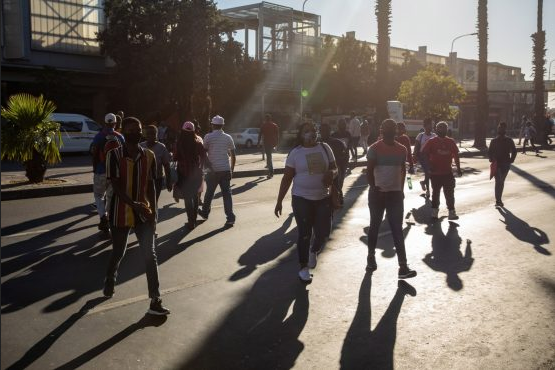A PANEL of economic advisers appointed by South African President Cyril Ramaphosa warned against implementing a basic income grant in the world’s most unequal nation, saying the multibillion dollar cost could deepen debt and hinder economic growth.
As recently as September, Ramaphosa has said that a basic income grant — which would be the biggest of its kind globally if implemented — should be considered to alleviate poverty. That statement has put him at odds with his finance minister and business organisations that say the proposal is unaffordable.
“Our vision must be to promote employment rather than ever-increasing state-funded income support,” the Presidential Economic Advisory Council said in a briefing note sent to the president and seen by Bloomberg.
“We face a real danger of policy error at a macroeconomic level where we will limit our economy’s growth and job-creation potential by increasing the system of social grants payments in an unsustainable manner.”
Calls for the introduction of a basic income grant from civil society organisations and labour unions have increased after the government agreed to a temporary R350 payment to the unemployed because of the impact of the Covid-19 pandemic.
More than a third of South Africans are unemployed and riots in July that were the worst since the end of apartheid were attributed to rising poverty.
The Thomas Piketty-backed World Inequality Lab said in a study that inequality in the country hasn’t improved since 1994 and the richest 3 500 South African adults own more than the poorest 32 million people.
Tyrone Seale, a spokesman for Ramaphosa, declined to comment. The document, which was prepared by the PEAC ahead of Ramaphosa’s State-of-the-Nation address on February 10, was reported on earlier by News24.
The PEAC, which Ramaphosa appointed in 2019, said a study into the feasibility of a basic income grant commissioned by the government last year failed to assess the impact on the economy that the required increases in taxes and debt would have.
“What if the proposed increased taxes limit growth and job creation slows even further?” the PEAC said. “What if South African fiscal policy loses credibility and the spreads in our borrowing costs rise higher and an even greater proportion of our revenues must be paid to bondholders?”
South Africa, which at 3.3% of gross domestic product spends a greater proportion of its revenue on social support than most countries, is projected to spend R222 billion on social grants in the year through February.
Currently those are mostly in the form of child-support stipends and pensions. Before the Covid support payments, there was no allocation for the unemployed.
Excluding the pandemic support, more than 18 million people, or one in three South Africans, receive monthly payments.
The PEAC said that the Covid-relief program must end. Extending the Covid grant alone for a year would cost R35 billion, BNP Paribas said.
That payment is set at a level that’s about a quarter of the government’s own upper bound poverty line.
Expanding welfare payments in an unaffordable manner “would constitute a significant economic policy error — an error which would be difficult to correct and an error which would undermine the country’s overall growth and employment creation objectives,” the PEAC said.
- Bloomberg



